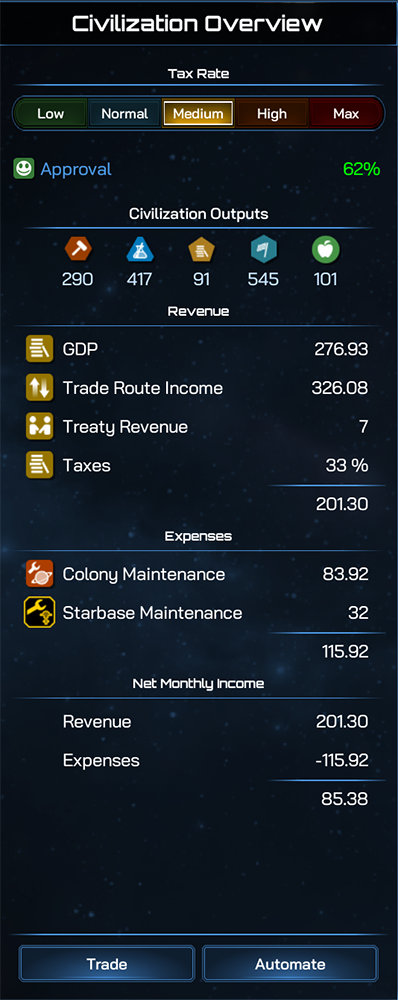Income: Difference between revisions
Kerri405848 (talk | contribs) No edit summary |
Kerri405848 (talk | contribs) No edit summary |
||
| Line 5: | Line 5: | ||
Most Civilizations main source of Income will come from taxing both their Citizens and the commercial vessels plying the Trade Routes shared with their neighbours. | Most Civilizations main source of Income will come from taxing both their Citizens and the commercial vessels plying the Trade Routes shared with their neighbours. | ||
{| class="wikitable" | |||
!! style="background-color: #1C4D8B; color: white;" | !! style="background-color: #1C4D8B; color: white;" | How Net Monthly Income Works | |||
|- | |||
| 1 | |||
| Calculate the Gross Domestic Product (GDP) of the Civilization: | |||
* A Core World's own Wealth Input score is combined with any attached Colonies Wealth Input to create its final Planetary Input score for Wealth Input. | |||
* This combined Wealth Input score is then added to the Tourism Income for the world. | |||
* This new Income value is then modified by the various Districts and Improvements built on the Core World, by the contributions of the world's Citizens and the Governor leading them, and by any Economic modules on Starbases attached to the Core World. Various Events, Civilization Policies, and Ideological Traits can further modify this value too. | |||
* The Crime percentage is applied as a negative product to Income value, reducing it. The higher the Crime rate, the larger the deduction. | |||
* The GDP is the sum of the Planetary Output Income score of every Core World in the player's Civilization. | |||
|- | |||
| 2 | |||
| Add the total Trade Route Income value, a sum of all active Trade Routes set up across the galaxy with the various Civilizations and Minor Races. | |||
|- | |||
| 3 | |||
| Add Treaty Revenue, the sum of all Credits coming in from other Civilizations as tribute or as payment made in Diplomatic negotiations. | |||
|- | |||
| 4 | |||
| Apply the Tax Rate set by the player in the Civilization Overview Screen. This final value AFTER tax is the Revenue score. | |||
|- | |||
| 5 | |||
| Deduct Expenses. Expenses consist of Ship Maintenance, Colony Maintenance, and Starbase Maintenance. | |||
|- | |||
| 6 | |||
| Calculate the Net Monthly Income by deducting the Expenses value from the Revenue value. | |||
|} | |||
Credits can come in from many other areas of the game too: as part of a trade deal with other Civilizations in Diplomacy, through Trade Routes established with foreign worlds, through selling Artifacts surveyed by your Flag Ships, as rewards for Quests and the outcomes of various Events and more. | Credits can come in from many other areas of the game too: as part of a trade deal with other Civilizations in Diplomacy, through Trade Routes established with foreign worlds, through selling Artifacts surveyed by your Flag Ships, as rewards for Quests and the outcomes of various Events and more. | ||
Likewise, the ways to spend Credits are myriad, and particularly in the early game, Credits are incredibly valuable in speeding along the expansion of your Civilization. A wise Civilization will not neglect their Credit economy! | Likewise, the ways to spend Credits are myriad, and particularly in the early game, Credits are incredibly valuable in speeding along the expansion of your Civilization. A wise Civilization will not neglect their Credit economy! | ||
Latest revision as of 16:10, 22 January 2024
Income & Credits

Credits are a general resource representing hard cash in the Galactic Civilizations universe, and the player can spend Credits to overcome many of the problems they'll face during a typical campaign to rule the galaxy. For this reason, setting up a robust economy to raise a healthy income of Credits will often be a major goal for most Civilizations, and some, such as the Corporate Sector and the Drath, require large amounts of Credits in their treasury to keep the Approval of their Citizens at a safe level.
Most Civilizations main source of Income will come from taxing both their Citizens and the commercial vessels plying the Trade Routes shared with their neighbours.
| How Net Monthly Income Works | |
|---|---|
| 1 | Calculate the Gross Domestic Product (GDP) of the Civilization:
|
| 2 | Add the total Trade Route Income value, a sum of all active Trade Routes set up across the galaxy with the various Civilizations and Minor Races. |
| 3 | Add Treaty Revenue, the sum of all Credits coming in from other Civilizations as tribute or as payment made in Diplomatic negotiations. |
| 4 | Apply the Tax Rate set by the player in the Civilization Overview Screen. This final value AFTER tax is the Revenue score. |
| 5 | Deduct Expenses. Expenses consist of Ship Maintenance, Colony Maintenance, and Starbase Maintenance. |
| 6 | Calculate the Net Monthly Income by deducting the Expenses value from the Revenue value. |
Credits can come in from many other areas of the game too: as part of a trade deal with other Civilizations in Diplomacy, through Trade Routes established with foreign worlds, through selling Artifacts surveyed by your Flag Ships, as rewards for Quests and the outcomes of various Events and more.
Likewise, the ways to spend Credits are myriad, and particularly in the early game, Credits are incredibly valuable in speeding along the expansion of your Civilization. A wise Civilization will not neglect their Credit economy!